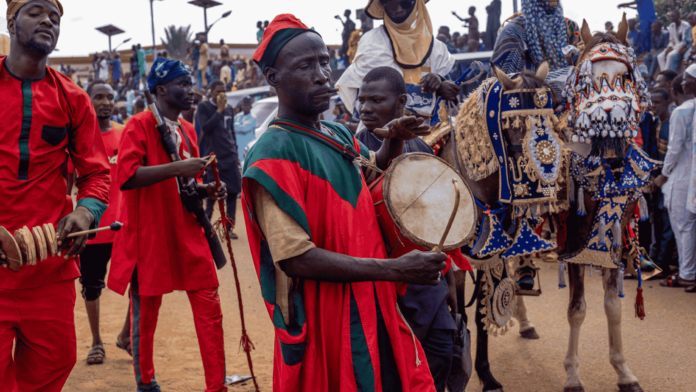The Durbar Festival is a vibrant celebration of northern Nigeria’s rich cultural heritage, bringing together the traditions of the Hausa and Fulani peoples. This centuries-old festival blends faith and festivity, held during significant Islamic holidays such as Eid al-Fitr and Eid al-Adha. At the heart of the Durbar is the majestic royal procession, where Emirate chiefs, warriors, and horsemen parade in stunning attire, showcasing the region’s deep-rooted history and pride. With its colorful display of royal pageantry and the splendor of decorated horses, the Durbar Festival offers an unforgettable experience of Nigerian culture at its finest.
When and Where is the Durbar Festival Celebrated?
The Durbar Festival typically coincides with major Islamic holidays, making it a movable event on the calendar. Key cities where the festival is celebrated include Kano, Katsina, Zaria, and Kaduna. Each city adds it’s unique flavor to the festivities, offering visitors a chance to experience regional variations of this grand tradition.
- Kano Durbar: Known for its scale and grandeur, the Kano Durbar is often considered the most famous.
- Katsina Durbar: Celebrated with deep historical significance, this version emphasizes the role of tradition.
- Zaria Durbar: Famous for its vibrant community participation.
- Kaduna Durbar: A blend of modernity and tradition, attracting tourists and dignitaries.
Highlights of the Durbar Festival
1. The Royal Procession
The centerpiece of the Durbar Festival is the royal procession, a spectacle of power and beauty. Emirs and other traditional leaders parade through the streets on horseback, surrounded by guards, drummers, and praise singers. The procession reflects the hierarchy and organization of traditional African societies.
2. Equestrian Display
The Durbar is synonymous with horses. Majestic horses adorned with intricate bridles, saddles, and colorful fabrics dominate the scene. The riders, clad in flowing robes and turbans, perform skillful maneuvers that captivate the audience.
3. Cultural Dances and Music
Traditional dances and music are integral to the Durbar Festival. Drummers, flutists, and singers create an electric atmosphere, celebrating the rich musical heritage of the region. The rhythmic beats and energetic performances are bound to leave spectators enthralled.
4. Artisan Exhibitions and Local Cuisine
The festival also provides a platform for local artisans to showcase their crafts, from intricate leatherwork to vibrant textiles. Visitors can indulge in authentic northern Nigerian cuisine, including delicacies like suya (spicy grilled meat), masa (rice cakes), and fura da nono (a millet-based drink).
Further Reading: Guide to the Argungu Fishing Festival: What to Expect
Tips for Attending the Durbar Festival
1. Plan Your Trip Early
Since the festival aligns with Islamic holidays, confirm the dates in advance and make travel arrangements early. Accommodations in key cities like Kano and Katsina can fill up quickly.
2. Dress Modestly and Comfortably
Northern Nigeria has a predominantly Muslim population with conservative cultural values. Dress modestly out of respect and wear comfortable clothing and footwear for navigating the bustling festival grounds.
3. Engage with Locals
The Durbar Festival is a communal celebration, and locals are often eager to share their culture with visitors. Engage with them to learn more about the history and significance of the event.
4. Capture the Moment
The vibrant colors, elaborate costumes, and lively atmosphere make the Durbar Festival a photographer’s dream. Bring your camera or smartphone to capture these unforgettable moments, but always ask for permission before taking pictures of individuals.
Why You Should Attend the Durbar Festival
The Durbar Festival is more than just a celebration; it is a window into the soul of a community. It brings together history, culture, and artistry in a way that few events can. Attending the festival allows you to witness the enduring traditions of the Hausa and Fulani people while celebrating their resilience and unity.
Whether you’re drawn by the allure of the royal procession, the rhythmic beats of traditional music, or the vibrant colors of the costumes, the Durbar Festival promises an experience unlike any other. Plan your visit and immerse yourself in this kaleidoscope of colors, culture, and community.




